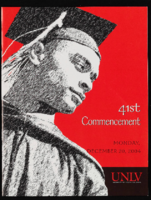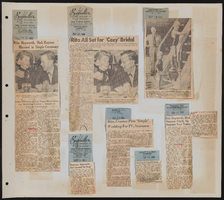Search the Special Collections and Archives Portal
Search Results
Delores Brownhofer Neonis Papers
Identifier
Abstract
Collection is comprised of the Delores Brownhofer Neonis Papers dating from 1941-1975. The collection contains bank records, payroll information, recipes, and sales slips for the Original Steak House on 1st Street, Las Vegas, Nevada. Also included are the Las Vegas Monorail System evaluations and financial feasibility reports, proposals, and correspondence. The Neonis real estate papers contain appraisals, property sales, lease and purchase agreements, promotional materials, maps, and correspondence. There are personal items that consist of a Helldorado button, poker chips, photographs, plays, and voting information.
Archival Collection
Slavin Family Papers
Identifier
Abstract
The Slavin Family Papers (1905-1965) are materials related to Hale B. Slavin, a doctor who practiced in Las Vegas, Nevada from 1933 until his death in 1965, his wife Ruth Slavin, and his children, Thomas and Sarah Slavin. The collection includes memorabilia of events and commemorations, Hale B. Slavin's schoolwork from elementary through college, Thomas and Sarah Slavin's elementary school work, photographs, family correspondence, postcards, a diploma, and newspaper clippings.
Archival Collection
Lauren M. Brown oral history interview
Identifier
Abstract
Oral history interview with Lauren M. Brown conducted by Claytee D. White on February 21, 2018 for the Remembering 1 October Oral History Project. In this interview, Lauren M. Brown discusses her history with Las Vegas, Nevada, starting from when she moved to the city in 1997. She describes her experience as one of the many who stood in line to donate blood on October 2, 2017, the day after the 2017 Las Vegas mass shooting. Brown talks about what stood out on that day, including the overwhelming amount of people waiting to donate blood and the people who brought drinks and pastries for those waiting. She speaks about how that day showed her the heart of Las Vegas and changed her perspective of the city. Brown also discusses her correspondence with the Healing Garden to give ideas for the design of a permanent memorial for the tragedy.
Archival Collection
Hal Belfer Papers
Identifier
Abstract
The Hal Belfer Papers chronicle the professional career of producer, choreographer, and writer Harold (Hal) Belfer (1935-2004) and consist of general materials regarding his work in Hollywood, California and Las Vegas, Nevada. One of the scrapbooks contains photographs of famous personalities from his early work in movies and theater. Also included are newspaper clippings, scripts, sheet music, arrangements, and photocopies of "Fabulous Las Vegas" and "Ken's Spotlight on Las Vegas," where Belfer had made notations.
Archival Collection
Mike Miller Papers
Identifier
Abstract
The Mike Miller Papers (1971-2014) include advertisements, books, and paintings by Las Vegas, Nevada-based artist and graphic designer Mike Miller. Materials include photographs, art prints, advertisements, newspaper clippings featuring Miller's advertisements, casino advertisements, and books designed, written, or illustrated by Miller.
Archival Collection
Morton "Mort" Saiger Portraits and News Articles
Identifier
Abstract
The Morton "Mort" Saiger Portraits and News Articles (1960-1987) consists of four newspaper and journal articles about Saiger and the Last Frontier Hotel Casino, two professional photographic portraits of Saiger, and a presentation plaque from the International Golf Club.
Archival Collection
Norman Kaye Photograph Collection
Identifier
Abstract
The Norman Kaye Photograph Collection (approximately 1950-1970) consists of black-and-white photographic prints of Norman Kaye and the Mary Kaye Trio in performance at the Hotel Last Frontier in Las Vegas, Nevada.
Archival Collection
Ron Lawrence Collection of 1980 Reno Gay Rodeo Photographs
Identifier
Abstract
The Ron Lawrence Collection of 1980 Reno Gay Rodeo Photographs consists of 87 35mm color slides of the 1980 Gay Rodeo in Reno, Nevada, presumably taken by Lawrence. Images show different events such as saddle bronc and barrel racing. Also included are views of spectators sitting in the stands, dancing, and preparing for events.
Archival Collection

University of Nevada, Las Vegas (UNLV) 41st commencement program
Date
Archival Collection
Description
Commencement program from University of Nevada, Las Vegas Commencement Programs and Graduation Lists (UA-00115).
Text

